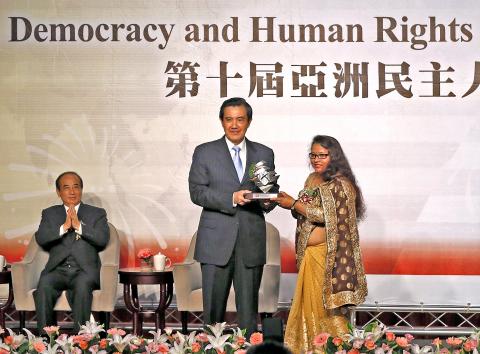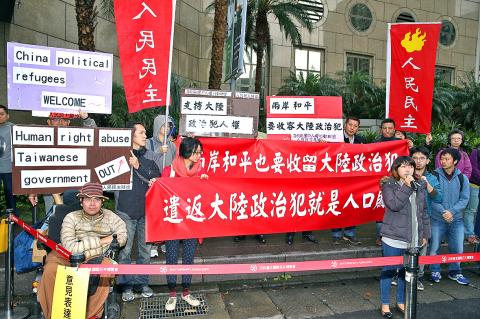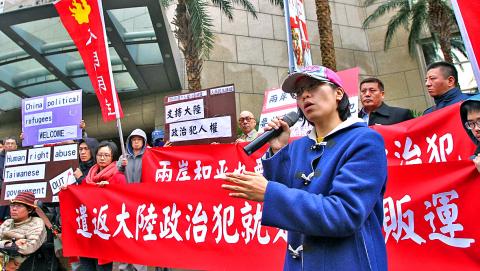Sunita Danuwar of Nepal yesterday won the Asia Democracy and Human Rights Award, which was presented to her by the Taiwan Foundation for Democracy at a ceremony in Taipei, in recognition of her dedication to rescuing female victims of human trafficking.
Once a sex slave, Danuwar is now president of Shakti Samuha, a non-governmental organization in Nepal that provides shelter, legal aid, vocational training and counseling to survivors of human trafficking.
The award was presented to Danuwar by President Ma Ying-jeou (馬英九) at the ceremony on International Human Rights Day.

Photo: EPA
In an address at the ceremony, Ma praised Danuwar’s unrelenting efforts to rescue female victims of human trafficking, saying she has also helped raise awareness of the problem.
Danuwar has built a good reputation at home and abroad, going from a victim to an activist for women’s rights, Ma said.
The annual market value of human trafficking and child prostitution is estimated at tens of billions of US dollars, Ma said, adding that the efforts to combat the problem must continue.

Photo: Liao Chen-huei, Taipei Times
Taiwan is willing to work jointly with the international community to fight human trafficking, which is a blight on human civilization, he said.
The annual Asia Democracy and Human Rights Award was established by the Taiwan Foundation for Democracy in 2006 to recognize individuals or organizations in Asia that have made significant contributions to promoting democracy and advancing human rights through peaceful means.
Funded mainly by the government, the Taiwan Foundation for Democracy is a non-profit organization in Taipei that aims to promote democracy and support the improvement of human rights conditions.

Photo: CNA

A preclearance service to facilitate entry for people traveling to select airports in Japan would be available from Thursday next week to Feb. 25 at Taiwan Taoyuan International Airport, Taoyuan International Airport Corp (TIAC) said on Tuesday. The service was first made available to Taiwanese travelers throughout the winter vacation of 2024 and during the Lunar New Year holiday. In addition to flights to the Japanese cities of Hakodate, Asahikawa, Akita, Sendai, Niigata, Okayama, Takamatsu, Kumamoto and Kagoshima, the service would be available to travelers to Kobe and Oita. The service can be accessed by passengers of 15 flight routes operated by

Chinese spouse and influencer Guan Guan’s (關關) residency permit has been revoked for repeatedly posting pro-China videos that threaten national security, the National Immigration Agency confirmed today. Guan Guan has said many controversial statements in her videos posted to Douyin (抖音), including “the red flag will soon be painted all over Taiwan” and “Taiwan is an inseparable part of China,” and expressing hope for expedited reunification. The agency last year received multiple reports alleging that Guan Guan had advocated for armed reunification. After verifying the reports, the agency last month issued a notice requiring her to appear and explain her actions. Guan

GIVE AND TAKE: Blood demand continues to rise each year, while fewer young donors are available due to the nation’s falling birthrate, a doctor said Blood donors can redeem points earned from donations to obtain limited edition Formosan black bear travel mugs, the Kaohsiung Blood Center said yesterday, as it announced a goal of stocking 20,000 units of blood prior to the Lunar New Year. The last month of the lunar year is National Blood Donation Month, when local centers seek to stockpile blood for use during the Lunar New Year holiday. The blood demand in southern Taiwan — including Tainan and Kaohsiung, as well as Chiayi, Pingtung, Penghu and Taitung counties — is about 2,000 units per day, the center said. The donation campaign aims to boost

The Central Weather Administration (CWA) said a magnitude 4.9 earthquake that struck off the coast of eastern Taiwan yesterday was an independent event and part of a stress-adjustment process. The earthquake occurred at 4:47pm, with its epicenter at sea about 45.4km south of Yilan County Hall at a depth of 5.9km, the CWA said. The quake's intensity, which gauges the actual effects of a temblor, was highest in several townships in Yilan and neighboring Hualien County, where it measured 4 on Taiwan's seven-tier intensity scale, the CWA said. Lin Po-yu (林柏佑), a division chief at the CWA's Seismological Center, told a news conference